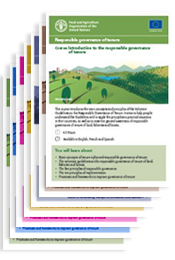Governance of tenure newsletter - May 2023
The “Voluntary Guidelines on the Responsible Governance of Tenure of Land, Fisheries and Forests in the Context of National Food Security” are referred to as the “Voluntary Guidelines" or the VGGT in this newsletter.
- Addressing the role of land tenure for promoting RITI
- Sustainable land use planning as key factor
- Framing LT and RITI within territorial development approaches
- RITI achievement is possible
- Equal access to land is necessary for RITI
- Land Governance Indices developed in partnership with Cadasta Foundation
- New Land Policy issued in Mozambique with FAO’s support
- FAO supports Local Consultations in the Participatory Process of Preparing a National Land Policy in Chad
- New publications
- E-Learning
Addressing the role of land tenure for promoting RITI
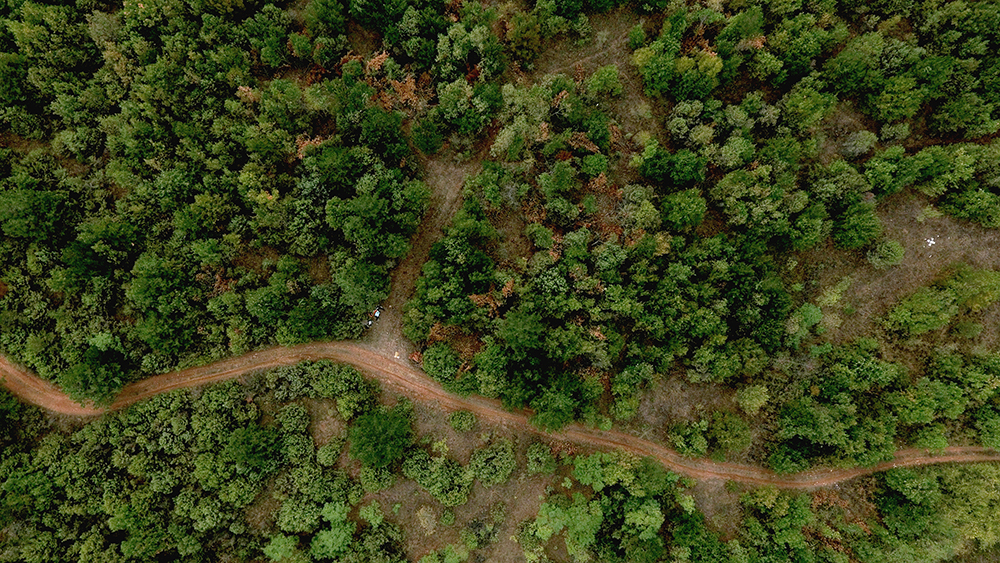
© FAO
The role of access to land and land tenure in structural transformation (ST) processes has been largely addressed in the early development literature. It is known that agricultural productivity growth played a crucial role at the initial stage of ST of several late comers and developing countries, where expanded access to land and tenure security in favour of million small-scale, landless and tenant farmers, coupled with wider agricultural policies, were the prime movers of rapid and high growth rates. On the contrary, countries that failed to implement successfully land redistribution policies have witnessed insufficient structural transformation, middle-income traps or prolonged economic stagnation, and are still struggling with poverty and food insecurity.
Recent analysis continues to highlight the importance of agricultural productivity growth for structural change in many agriculture-dense low-income countries. Despite increasing job diversification, the absolute number of rural dwellers who depend on access to land for their livelihoods is still raising, and the growth of non-farm incomes is not at pace with the population growth and subsequent entrance of million youths into the labor market. Moreover, rural poverty and food insecurity remain widespread in several upper-middle income countries with dual agrarian structures that have been experiencing deindustrialization in the last decades.
Yet, old and new fundamental challenges pose a series of interrelated questions as to the viabilities and operationalities of land interventions for the development of agricultural strategies, namely growing land inequalities, the impacts of climate change on land availability, the need to address land within an agrifood system approach, and the enduring conflicts associated to land politics. In March 2023, FAO organized an international expert consultation on several dimensions of RITI (Resilient Inclusive Rural Transformation), including the role played by land tenure and governance for sustainable development. This issue of the Governance of Tenure newsletter synthetizes the debate opened by a draft paper that was submitted by the FAO Land Tenure team for discussion of four panellists: Malcolm Childress (Global Land Alliance), Arilson Favareto (Universidade Federal do ABC - UFABC), Thomas Jayne (Michigan State University - MSU), and Dzodzi Tsikata (School of Oriental and African Studies - SOAS).
The four panellists were asked what is to be done and what needs to change, under different socio-economic, environmental and governance contexts, and each of them address specific questions according to her/his areas of expertise.
Sustainable land use planning as key factor
By Malcolm Childress (Global Land Alliance)
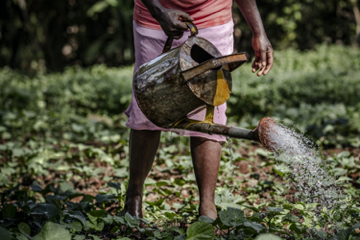
FAO/Luis Tato
Outcomes from the last three decades indicate that improved pathways are needed for widespread, inclusive, and resilient rural transformation. This is especially true in a global context of increased risk and vulnerability due to climate change, population growth, and the potential of public health and political shocks.
Climate change is a key factor linking land policies to the possibilities of achieving RITI, as it will likely reduce the supply of easily available arable land, increase the variability of yields due to weather variability and put pressure on ecosystem services like freshwater availability, soil fertility, biodiversity and forest carbon storage.
These effects call for intensive efforts to improve land use by improving stewardship and fostering resilience. Achieving these improvements requires bringing both more democracy and more knowledge into local land governance processes. Improving tenure security is a part of this response in some places, particularly where the "tenure gap" between local occupation and formal recognition generates high insecurity leading to vulnerability and unsustainable land use, but it is certainly not the only land policy response.
Land use planning and land governance (decision-making, allocation, enforcement, integration with agricultural and forest policy, etc.) are also critical for climate response. Recognition of rights should be a foundational element of an extensive package of policies and investments for achieving improved land use. Expanded recognition of community and customary lands in Africa, LAC and Asia should be a fundamental part of the creation of this package of policies and investments to foster climate resilient stewardship of land and natural resources.
Framing LT and RITI within territorial development approaches
By Arilson Favareto (UFABC)
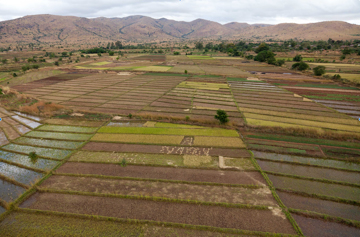
FAO/Yasuyoshi Chiba FAO
Three ideas can be considered when it comes to analyzing the relationship between land tenure and the RITI approach in the light of the debates on rural development in the past decades and based on the Brazilian case. Addressing the debate about RITI within an agri-food system perspective is very welcome as it represents a step further in relation to previous approaches focusing solely on agricultural productivity growth. However, some caution is necessary:
1) There is a risk involving a potential "missing link" regarding territorial development theories, that were fundamental in the previous decade. Without recovering the learnings from that cycle, the agri-food system framework can incur in an agricultural sectoral perspective (and its limits), even if under a systemic approach. This has consequences for the ways we can analyze land tenure.
2) Current structural transformations suggest a growing process of heterogenization/differentiation of the relationships between agriculture and other economic sectors in a post-industrial world. Even urbanization has not only one form. Consequently, there are multiple possibilities for territorial configurations involving the interdependencies between land tenure and other domains of social and economic life. This idea of multiple configurations invites us to pay attention not only on the analysis of "impacts" of land tenure over specific dimensions, according to a linear approach (productivity, income, demands, multipliers) - we need to focus on the "interdependencies" between land tenure and other variables, such as local markets and rural-urban linkages and its multiple possibilities of combination, with corresponding different effects for resilience and inclusion.
3) The Brazilian case is an example of heterogeneity patterns (between countries and within the country) and of how land tenure needs to be seen as a crucial variable, since combined with others. In Brazil, land tenure, isolated, explains inequalities, for instance, but it does not explain poverty. It depends on the other territorial variables for each territorial configuration. Such an approach can inspire new land tenure polices combined with other instruments capable of acting in the "leverage points" of territorialized socioecological systems.
By Thomas Jayne (MSU)
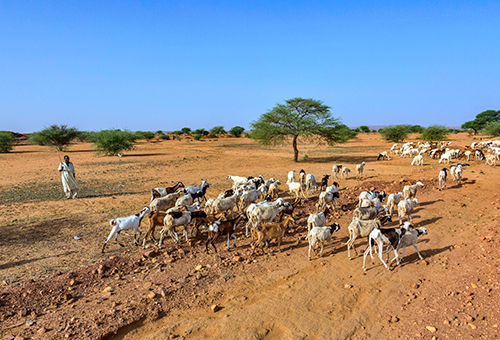
© FAO/Andrew Esiebo
Low-income countries can achieve resilient and inclusive rural transformation (RITI) in the next two to three decades if inclusive, resilient, development-promoting policies and public investments are instituted. The question for researchers is to determine what a feasible inclusive structural transformation pathway would look like and set in the place the appropriate land policies and investments to foster that process, acknowledging that policy responses will differ according to the highly variable demographic, economic and biophysical conditions found in developing countries.
There is a solid foundation of empirical evidence to guide this endeavor. First, to achieve RITI means explicitly adopting a “full cost accounting framework”: account for the costs of a fossil fuel-dependent food system that pollutes our land, rivers, and oceans; contributes to climate change; and unhealthy foods/diets and disease. These external costs associated with feeding the planet are very high and have not sufficiently been factored into food systems policies and investments. If these external costs were more fully considered, we would be agitating more forcefully for fundamental food systems transformation that put resilience, sustainability, and human health first, and then asks how can food systems be transformed to take account of these objectives.
So, what are the implications for land policies? Within a full cost accounting framework, then, three actions seem to be priorities to effectively address the quadruple challenge of environmental sustainability, economic resilience, increased agricultural land productivity, and social inclusiveness:
1. Support forms of land use that contribute to soil health, carbon sequestration, and sustainable forms of agricultural land management.
2. Promote productivity growth on existing farmland rather than continued reliance of expanding area under crops as the way of feeding cities and towns. By producing more on existing farmland, the pressure to cut down more forests and grasslands to feed rapidly growing population can be abated (again with the help of supporting land policies, protection of forests, nature conservancies, etc). Promoting productivity growth on existing farmland requires greater support for agricultural R&D systems and extension systems.
3. Protect land rights for smallholders, rural women and youth, preventing large-scale acquisitions that have no support from local inhabitants.
Equal access to land is necessary for RITI
By Dzodzi Tsikata (SOAS)
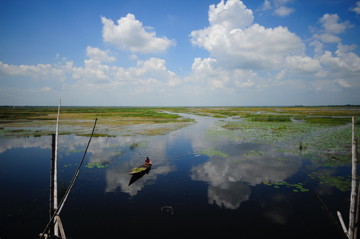
© FAO/Munir Uz Zaman
Beyond its importance as a factor of production, equal access to land is a necessary condition for reducing inequalities and building resilience, while supporting food and nutrition security, peace and political stability, and climate action. Addressing Africa’s land questions is therefore fundamental for turning around agrarian stagnation and promoting inclusive and sustainable rural transformation. Africa’s land questions are multiple, interconnected, and influenced by the specific colonial histories of the different sub-regions. They include the contradictory processes of land fragmentation and land concentration that are creating arable land scarcity, driving land prices up, deepening tenure insecurity and resulting in inequalities between rural and urban areas, within rural areas, between capital and labour and between social groups structured by intersecting inequalities of gender, class, kinship, and generation. There is also increasing land use competition among different land uses- farming food crops, raw materials, and agricultural commodities; pastoralism; mining; real estate and infrastructure, which instigates land conflicts.
Addressing these land questions will require the recognition of land markets as social institutions that are as important as non-market institutions. Success will depend on the capacity and consistency of land institutions in dealing with the fallouts of economic liberalization, the excesses of foreign direct investment, the decline in social policy, and the state’s robustness in planning and supporting rural development.
The developmental effects of the redistributive land reforms in Asia offer positive lessons for Latin America and Africa. Where redistribution cannot be pursued because of land scarcity or political sensitivities, other progressive policies including agricultural rent control, the reform of agricultural tenancies as well as regulations against land concentration which also protect farmers from dispossession, are necessary. We should not prioritise titling and registration programmes, which are often expensive, difficult to sustain, erase a range of informal land arrangements, and have not been proven to increase security and reduce conflicts. Community based approaches to land reform also need constant interrogation because of deep-seated intra-group inequalities.
Land Governance Indices developed in partnership with Cadasta Foundation
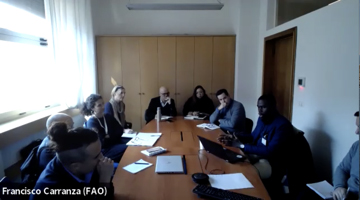
© FAO/Yasmine Iqbal
The FAO land tenure team partnered with the Cadasta Foundation in 2022 and successfully piloted a series of land administration indices in Tanzania to gauge progress on improved services in the land sector. These indices, which focused mostly on community land tenure were developed in close collaboration with the Ministry of Lands and Housing of Tanzania. The indices were on access to land information, ease of land registration, rate of land dispute resolution and financial allocations for land. A fifth index was developed on women’s access to land through private freehold titling.
On February 2nd, 2023, Mr. Wabwire Wambayi, Africa Regional Manager for Cadasta, visited FAO headquarters to present the experience and challenges incurred while developing the indices over the course of several months. The indices, which serve as a tool for accountability, will also be tested in Sierra Leone through an FAO project that promotes local and inclusive land governance in the course of 2023-2025.
New Land Policy issued in Mozambique with FAO’s support
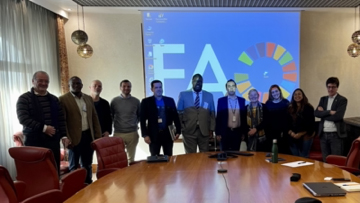
© FAO/Yasmine Iqbal
FAO has been a strategic partner on land tenure-related challenges for the government of Mozambique for over 20 years. Over the last 4 years, Mozambique embarked on a quest to revise their national land policy by creating a Commission for the Revision of the National Land Policy (CRPNT, Comissão de Revisão da Politica Nacional de Terras) that was charged with leading the process of collecting and collating information, processing the data, extensive public consultation meetings in different parts of the country and maintaining a constructive dialogue with CSO’s in the process.
FAO was amongst the development partners that supported the process of the revision of the land policy through a Technical Cooperation Programme (TCP) project that focused on developing a methodology for data collection. The new land policy was finally published in December 2022 and maintained one of Mozambique’s unique qualities in regard to tenure security, that there is no need for formalization of land rights for the government to recognize the customary tenure of local communities.
On February 20th, 2023, a self-sponsored study visit from three members of the CRPNT took place in Rome to meet with partners and learn from their expertise that can guide the implementation of the new land policy. The objective of their visit was to have an open presentation and discussion on their experience of the land policy revision and the expected results moving forward under the new legal dispensations instructed by the land policy itself. They met with experts from the land tenure team, the Office of Emergency and Resilience, the legal division, Land & Water and their geospatial unit, Gender team amongst others.
FAO supports Local Consultations in the Participatory Process of Preparing a National Land Policy in Chad
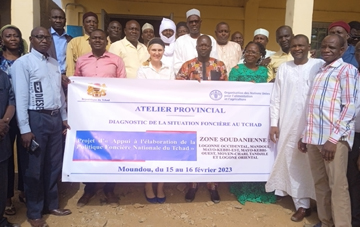
© FAO
On February 8 and 9, 2023, the Food and Agriculture Organization of the United Nations (FAO) organized a workshop to take stock of the land tenure situation in the Sahelian zone of Chad. The workshop brought together local authoress, civil society actors, private sector representatives and traditional chiefs from the 8 provinces. The workshop was the first in a series of consultation workshops to be undertaken in the three (3) different agro-ecological zones of Chad. The preparation of the National Land Policy was considered essential by stakeholders to prevent emerging land crises: increased pressure on natural resources, including recurrent land conflicts in both urban and rural areas, and especially farmer-herder conflicts, which are detrimental to vulnerable groups and more and more frequent.
Mrs. Amné Ali Abakar, President of a cooperative of women traders and member of the International Organization of Millennium Women (OIFM) stressed that 80 percent of conflicts in Chad are related to land. She explains the fatal negative social impact that this induces: “Conflicts between farmers and pastoralist is a real problem for us as women. Our men, brothers and children are dying because of these conflicts”. The preparation of the land policy is a key step in the inclusive land reform process, initiated in 2018 with the review of the draft land code. This process is inspired by the Voluntary Guidelines on the Responsible Governance of Tenure of Land, Fisheries and Forests (VGGT) and the Framework and Guidelines on Land Policy in Africa.
The debates held during these meetings and the group work focused on 4 thematic areas: 1) the legislative and regulatory framework of land administration; 2) urban land; 3) rural land; and 4) land use planning, in order to formulate recommendations based on the realities of each zone.
FAO and the Government of Chad engaged in the National Land Policy preparation process
The provincial workshops are organized within the framework of the project entitled "Support to the preparation of the National Land Policy of Chad", financed within the framework of FAO’s Technical Cooperation Programme for a period of two (2) years and implemented in collaboration with the Ministry in charge of Land Affairs.
The multi-stakeholder and multi-disciplinary approach is at the heart of the development process of this land policy. To this end, a multi-stakeholder committee in charge of coordinating the preparation of the land policy and reviewing the draft land tenure code was set up by Order No. 031/PCMT/PM/MAFDHU/SG/2022 of 31 August 2022.
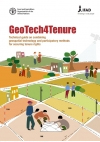
GeoTech4Tenure
In line with the VGGT, public and private investments globally are increasingly recognising responsible land governance as a determinant for the success and sustainability of their achievements. Investment managers understand that preventing and mitigating tenure related issues is a necessary step to achieve their objectives. This guide provides readers with a basic understanding of the functional linkages between land tenure and land-based investments.
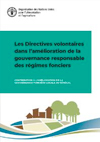
Les Directives volontaires dans l’amélioration de la gouvernance responsable des régimes fonciers.
Contribution à l'amélioration de la gouvernance foncière locale au Sénégal
La présente étude est une capitalisation des principaux résultats en termes d’outils, de produits ou de processus obtenus dans le cadre du projet de la FAO sur les Directives volontaires pour une gouvernance responsable des régimes fonciers applicables aux terres, aux pêches et aux forêts dans le contexte de la sécurité alimentaire au Sénégal, durant la période allant de 2017 à 2019. Cette capitalisation se concentre sur les processus par lesquels des connaissances implicites sur le foncier sont rendues explicites et diffusées auprès des populations.
A wide variety of e-learning courses are available on the Responsible Governance of Tenure. Learn about:
- making access to land, fisheries and forests more equitable
- how to protect people's tenure rights
- options to simplify the administration of tenure and make it accessible to all
- how to ensure disputes are resolved before they degenerate into conflict

